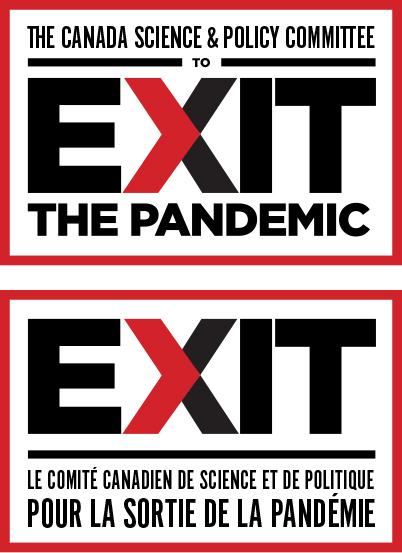- 1. To bring together Canada’s medical-scientific and policy communities – otherwise acting in solitudes – to exit the pandemic with speed
- 2. To change the psychology of the national discussion of the Covid-19 pandemic from the descriptive to the practical, and from the hysterical to the hopeful
- 3. To give practical policy advice and briefings to exit the pandemic across all of the systems of state & society
a. Covid-related public health
b. non-Covid health care
c. education (and related challenges for Canada’s kids and young people)
d. economics & business
e. social fabric of country
f. institutional structure of country
g. national unity
h. international dynamics
- 4. To effectuate the following “postural shifts” in Canadian thinking about the pandemic and the exit strategy:
- from the episodic to systems thinking
- from “follow the science” (which could last 100 years!) to “having science be a key input in policy decision-making informed from across the disciplines”
- from hysterical and defeatist to practical and purposeful
- from abstract to human (realities on the ground, at the coalface)
- from low energy to high energy
- from caprice to stability
Members of the Canada Science & Policy Committee to Exit the Pandemic:
Irvin Studin, PhD (co-chair) – President, The Institute for 21st Century Questions; Chair, Worldwide Commission to Educate All Kids (Post-Pandemic); Editor-in-Chief & Publisher, Global Brief Magazine (Richmond Hill, Ontario)
Dr. Kwadwo Kyeremanteng, MD (co-chair) – Head of Critical Care, The Ottawa Hospital (Ottawa, Ontario)
Dr. Martha Fulford, MD – Associate Professor of Medicine, Michael G. De Groote School of Medicine, McMaster University (Hamilton, Ontario)
Dr. Olga Kovalchuk, MD – Professor & Board of Governors Chair in Cancer and Canadian Institute of Health Research Chair in Gender and Health, University of Lethbridge (Lethbridge, Alberta)
Thomas Michalak, MD – Professor of Molecular Virology and Medicine (Hepatology)
Canada Research Chair (Tier 1) in Molecular Virology, Molecular Virology and Hepatology Research Group, Faculty of Medicine, Memorial University (St. John’s, Newfoundland)
Dr. Paul Perlon, MD – Head of Emergency Physician Group, Mackenzie Health Hospital (Richmond Hill, Ontario)
Edward Mirasty – Head of Education, Prince Albert Grand Council (Prince Albert, Saskatchewan)
Pierre Pettigrew – Former Minister of Health of Canada (Montréal, Québec)
Mike Aumond – Former Secretary to the Cabinet, Government of the Northwest Territories (Yellowknife, NWT)
Michael Schouldice – Past President, Arctic College (Rankin Inlet, Nunavut)
Fred Lazar – Professor of Economics, Schulich School of Business, York University (Toronto, Ontario)
Benjamin Ryan – Chief Commercial Officer, Air North (Whitehorse, Yukon)
Rosemarie Kuptana, Arctic Rose Foundation (Halifax, Nova Scotia)
Michael Barutciski – Professor of Political Science, Glendon College, York University (Montréal, Québec)
Alexandra Lysova – Associate Professor of Criminology, Simon Fraser University (Vancouver, British Columbia)
Le comité canadien de science et de politique pour sortir de la pandémie
Objectifs:
- 1. Rassembler les communautés médicales et scientifiques avec celles des politiques publiques pour qu’elles ne travaillent plus en solitude et qu’on puisse sortir de la pandémie rapidement
- 2. Changer la psychologie du débat national sur la COVID-19 du descriptif au pratique, et de l’hystérique au prometteur
- 3. Offrir des conseils pratiques sur les politiques publiques qui aideront à sortir de la pandémie à travers tous les systèmes étatiques et sociétaux
a. la santé publique liée à la COVID-19
b. la santé publique non liée à la COVID-19
c. l’éducation (et les défis connexes pour les enfants et les jeunes canadiens)
d. l’économie et les affaires
e. le tissu social du pays
f. la structure institutionnelle du pays
g. l’unité nationale
h. les dynamiques internationales
- 4. Effectuer les «ajustements de posture» suivants concernant la pensée canadienne sur la pandémie et la stratégie de sortie:
- de l’épisodique à la pensée systémique
- de « suivre la science » (qui pourrait durer un siècle!) à « traiter la science comme un facteur clé dans les décisions informées par toutes les disciplines »
- de l’hystérique (et défaitiste) au pratique (et ciblé)
- de l’abstrait à l’humain (tenant compte des réalités sur le terrain)
- de basse énergie à forte énergie
- du caprice à la stabilité
Membres du Comité canadien de science et de politique pour sortir de la pandémie:
Irvin Studin, PhD (co-président) – Président de l’Institut des Questions pour le 21e Siècle; Président de la Commission mondiale pour scolariser tous les enfants (post-pandémie); Rédacteur en chef et Éditeur du magazine Global Brief (Richmond Hill, Ontario)
Dr Kwadwo Kyeremanteng, MD (co-président) – Chef du Département des soins critiques, L’Hôpital d’Ottawa (Ottawa, Ontario)
Dre Martha Fulford, MD – Professeure agrégée en médecine, Michael G. De Groote School of Medicine, McMaster University (Hamilton, Ontario)
Dre Olga Kovalchuk, MD – Professeure et titulaire d’une chaire de recherche du Conseil des gouverneurs en radiobiologie et d’une chaire de recherche des IRSC sur le genre et la santé, University of Lethbridge (Lethbridge, Alberta)
Dr Thomas Michalak, MD – Professeur de virologie moléculaire (hépatologie) et titulaire d’une chaire de recherche du Canada en virologie moléculaire, Memorial University (Saint-Jean, Terre-Neuve)
Dr Paul Perlon, MD – Chef du groupe des urgentologues, Mackenzie Health Hospital (Richmond Hill, Ontario)
Edward Mirasty – Chef de l’éducation, Grand conseil de Prince Albert (Prince Albert, Saskatchewan)
Pierre Pettigrew – Ancien ministre fédéral de la Santé (Montréal, Québec)
Mike Aumond – Ancien secrétaire du Conseil exécutif, Gouvernement des Territoires du Nord-Ouest (Yellowknife, TNO)
Michael Schouldice – Ancien président du Collège de l’Arctique (Rankin Inlet, Nunavut)
Fred Lazar – Professeur, Schulich School of Business, York University (Toronto, Ontario)
Benjamin Ryan – Directeur commercial, Air North (Whitehorse, Yukon)
Rosemarie Kuptana, Arctic Rose Foundation (Halifax, Nouvelle-Écosse)
Michael Barutciski, LLD – Professeur agrégé, Collège universitaire Glendon, York University (Montréal, Québec)
Alexandra Lysova – Professeure agrégée de criminologie, Simon Fraser University (Vancouver, Colombie-Britannique)


 21CQ
21CQ 


